Short telomeres induce a DNA damage response in Saccharomyces cerevisiae
- PMID: 12631718
- PMCID: PMC151574
- DOI: 10.1091/mbc.02-04-0057
Short telomeres induce a DNA damage response in Saccharomyces cerevisiae
Abstract
Telomerase-deficient Saccharomyces cerevisiae cells show a progressive decrease in telomere length. When grown for several days in log phase, the tlc1Delta cells initially display wild-type growth kinetics with subsequent loss of growth potential after which survivors are generated via RAD52-dependent homologous recombination. We found that chromosome loss in these telomerase-deficient cells only increased after a significant decline in growth potential of the culture. At earlier stages of growth, as the telomerase-deficient cells began to show loss of growth potential, the cells arrested in G2/M and showed RNR3 induction and Rad53p phosphorylation. These responses were dependent on RAD24 and MEC1, suggesting that short telomeres are recognized as DNA damage and signal G2/M arrest.
Figures

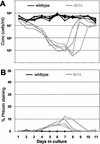

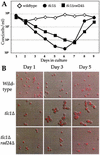
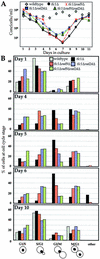
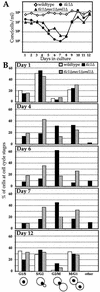
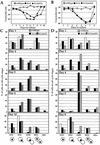
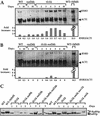
References
-
- Allen JB, Zhou Z, Siede W, Friedberg EC, Elledge SJ. The SAD1/RAD53 protein kinase controls multiple checkpoints and DNA damage-induced transcription in yeast. Genes Dev. 1994;8:2401–2415. - PubMed
-
- Blasco MA, Lee H-W, Hande PM, Samper E, Lansdorp PM, DePinho RA, Greider CW. Telomere shortening and tumor formation by mouse cells lacking telomerase RNA. Cell. 1997;91:25–34. - PubMed
-
- Brachmann CB, Davies A, Cost GJ, Caputo E, Li J, Hieter P, Boeke JD. Designer deletion strains derived from Saccharomyces cerevisiae S288C: a useful set of strains and plasmids for PCR-mediated gene disruption and other applications. Yeast. 1998;14:115–132. - PubMed
-
- Chan SW, Chang J, Prescott J, Blackburn EH. Altering telomere structure allows telomerase to act in yeast lacking ATM kinases. Curr Biol. 2001;11:1240–1250. - PubMed
-
- Charles JF, Jaspersen SL, Tinker-Kulberg RL, Hwang L, Szidon A, Morgan DO. The Polo-related kinase Cdc5 activates and is destroyed by the mitotic cyclin destruction machinery in S. cerevisiae. Curr Biol. 1998;8:497–507. - PubMed
Publication types
MeSH terms
Substances
Grants and funding
LinkOut - more resources
Full Text Sources
Other Literature Sources
Molecular Biology Databases
Research Materials

